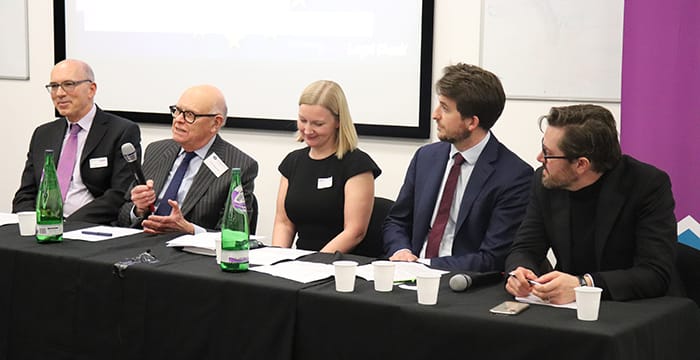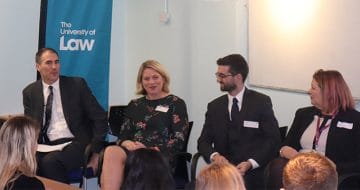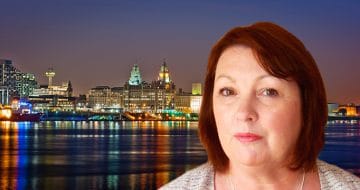But a panel of EU law experts predict otherwise

What Brexit outcome do you most support? This question was put to 80 attendees in a poll at last week’s student event, ‘How will Brexit disarray affect future lawyers?’, at The University of Law (ULaw) Moorgate.
So, what were the results? While 52% of attendees were in favour of a second referendum, more commonly known as a ‘People’s Vote’, 25% supported a Norway-style deal, allowing continued access to the single market. Following closely behind, with 18% of the vote, was Theresa May’s withdrawal agreement — the final version of which has yet to be agreed. Bringing up the rear, and securing a mere 5%, was a ‘no deal’ scenario.
But what outcome did the panel of Brexit experts think will happen?
Sir Alan Dashwood QC — Henderson Chambers
First to offer insight was Henderson Chambers barrister Sir Alan Dashwood QC. Sir Alan explained that a ‘People’s Vote’ would be his preferred outcome but noted the difficulties in deciding a question to put to the electorate in a second referendum. The three alternatives would be: the Prime Minister’s deal, no deal and to remain in the European Union (EU).
According to Sir Alan, a more “politically saleable” outcome is the Norway-plus deal, which would see the UK join Norway inside the EU’s single market. In addition, to avoid a hard border on the island of Ireland, the UK would have to be part of a customs union with the EU, he explained.
Although confident that a parliamentary majority would stop a no deal scenario, Sir Alan did express some concern. In the event of no deal, he warned that lawyers possessing UK qualifications alone would lose their access to the EU legal market. This could see Sir Alan himself, who has appeared regularly before the EU courts for some 30 years, lose both his rights of audience and lawyer-client privileges.
However, drawing comparisons between Brexit and the uncertainty around the UK joining the EU in the mid 70s, Sir Alan ended on an optimistic note: “If the legal professions were able to adapt to that change as well as they did, I’m sure we’ll adapt to this one.”
Andrew Eaton — Hogan Lovells
Next up was Andrew Eaton, an associate at Hogan Lovells specialising in public law and policy, who recently released a lawyer’s guide to a no deal Brexit.
Eaton was quick to remind the audience that a second referendum is not actually a Brexit outcome, but rather a means to an outcome. This option postpones the difficult decision of whether to leave or remain in the EU. Now a key player in Hogan Lovells’ Brexit team, Eaton went on to suggest that the current political deadlock was making a hard Brexit more likely by the day.
Trevor Tayleur — The University of Law
ULaw associate professor Trevor Tayleur admitted that he had felt optimistic about a second referendum, with a view to remaining in the EU. This, Tayleur explained, stemmed from mounting backbencher support across political parties for a ‘People’s Vote’. However, with the Labour leader, Jeremey Corbyn, dismissing calls to support this option, Tayleur conceded that achieving majority support in parliament was unlikely. In light of this, Tayleur, who played a key role in creating ULaw’s EU syllabus during the mid 90s, predicted Brexit will be a “toss up” between May’s deal and no deal.
Tayleur also expressed his concern at the “game of chicken” occurring between the British government and the EU Commission. He noted that some on the British side (such as the pro-Brexit European Research Group) would be quite happy if the UK left the EU without an exit deal in place. Nonetheless, Tayleur assured the audience, “sanity will prevail.”
Lorraine Johnston — Ashurst
Looking ahead Ashurst counsel Lorraine Johnston predicted that the Brexit back and forth will continue until parliament finally passes May’s deal, with hours to spare before the Brexit deadline.
But facing a no deal scenario, Johnston, who often advises clients on regulatory developments impacting financial services, remained pragmatic. Law firms, she explained, are “quite agile” in response to change. Drawing comparisons between Brexit and the 2007 global financial crisis, Johnston stressed that law firms will see levels of activity move around different departments as client demands shift in the post Brexit world. She added: “Brexit is just change — we’ll all survive and might even come out of it stronger.”
James Webber — Shearman & Sterling
Shearman & Sterling partner James Webber believed a second referendum to be the most unlikely option. Webber, who specialises in UK and EU competition law, stressed: “This parliament was elected on delivering Brexit and it has repeatedly voted in favour of Brexit — so I think we have to say, Brexit is the most likely thing to happen.”
Weighing up “no deal or her [May’s] deal”, Webber anticipates the latter succeeding but remains positive either way. From the perspective of a US law firm, membership of the EU is unlikely to change London’s standing in the legal world. Rather, London’s ‘cluster effect’, which sees expertise from law, financial services and insurance all come together, ensures the City enjoys a comparative advantage in the global market.
For aspiring lawyers yearning to succeed in the post-Brexit world, Webber stressed the importance of political and commercial awareness. In a new age of lawyers, he explained, politics is becoming more intrusive on decisions traditionally made by technical experts. In which case, he added, “learning about politics is not a bad thing for lawyers to do.”


